Our researchers published in "Molecular Therapy'
The latest issue of the journal Molecular Therapy published by the American Society for Gene and Cell Therapies features an article written by researchers from the our Department. The aim of our study was to determine the mechanism of transduction of human heart cells by viral vectors based on adeno-associated viruses (AAV) and to identify strategies to increase the efficiency of this process.
Viral vectors are used in gene therapy to introduce genetic material into body cells for therapeutic purposes. Clinical trials demonstrate the relatively high effectiveness and safety of AAV vectors (compared to other therapeutic nucleic acid carriers). Unfortunately, the main limitation in most applications, including cardiovascular diseases, is still the issue of achieving effective transduction and efficient expression of the transgene.
The results of the project shed new light on the importance of the CK2 protein kinase in the host-AAV vector interaction, identifying the activity of this kinase as a key barrier reducing transduction efficiency and transgene expression. This creates the potential for the development of new therapeutic strategies.
The research was funded by the National Science Centere. Its authors are: Dr Izabela Kraszewska, Katarzyna Sarad, Dr Kalina Andrysiak, Dr Aleksandra Kopacz, Prof. Józef Dulak and Dr hab. Agnieszka Jaźwa-Kusior from the JU Faculty of Biophysics, Biochemistry and Biotechnology as well as Luisa Schmidt and Prof. Marcus Krüger from the University of Cologne.
The article Casein kinase 2 activity is a host restriction factor for AAV is available on the website of the journal Molecular Therapy in open access format.
Publication date: 08.01.2024
__________________________________________
Our paper in the "Cardiovascular Research"
Scientists from the our Department are unravelling the previously unknown mechanisms of heart function disorders in patients with Duchenne muscular dystrophy (DMD). Their studies have been recently published in Cardiovascular Research, one of the leading journals in the field of basic and clinical research into heart and circulatory system diseases.
In our study described in the paper ‘Dysregulated iron homeostasis in dystrophin-deficient cardiomyocytes: correction by gene editing and pharmacological treatment’, whose first author is Dr Kalina Andrysiak, the former PhD student of Prof. Józef Dulak and Dr Jacek Stępniewski, we made use of induced pluripotent stem cells (iPSCs). The method of obtaining such cells, recognised with the 2012 Nobel Prize for its discoverer Shinya Yamanaka, allows creating the stem cells by means of genetic reprogramming of differentiated cells, like skin cells or leukocytes. Then the iPSCs can be differentiated into any cells of an adult human body, including cardiomyocytes, which are very difficult or almost impossible to obtain from patients.
The conducted studies for the first time indicated iron homeostasis dysregulation in dystrophin-deficient cardiomyocytes. Since the cardiomyocytes obtained from iPSCs match heart cells in very young patients, the achieved results suggest that a similar problem can already be found in hearts of several-year-old boys with Duchenne muscular dystrophy. As pointed out by the researchers, these problems might be caused by a dysfunction in mitoNEET protein, responsible for removing iron from mitochondria (cell energy generators), the level of which was lower in dystrophin-deficient cardiomyocytes as compared to the healthy cells. What is important is that repairing mutation in the dystrophin gene by editing it using CRISPR/Cas9 restored the proper level of mitoNEET protein, indicating that this technique, already used or tested in treatment for other diseases (recently it has been applied to treat sickle cell anaemia and thalassemia), can possibly be used to improve heart functions of DMD patients.
Dr Kalina Andrysiak, Dr Jacek Stępniewski, Prof. Józef Dulak, and their collaborators have subsequently showed that dysregulated iron homeostasis and its consequences (increased production of harmful free radicals) can be limited by treating cardiomyocytes with a small molecule compound removing the excess of iron from cells (deferoxamine) or pioglitazone – a stabiliser of mitoNEET protein. Interestingly, pioglitazone belongs to the group of drugs (thiazolidinediones) used to treat diabetes by reducing concentration of glucose in the blood.
According to us, the obtained results provide grounds for considering using the aforementioned medications or similar drugs in DMD treatment. Another reason for their use is the dysregulation of carbohydrate homeostasis and insulin function observed in DMD patients, which can also possibly be normalised with pioglitazone or similar substances. Obviously, relevant clinical tests can only be considered after further experimental studies aimed to verify the results discussed in the our latest paper.
Publication date: 02.01.2024
__________________________________________
Research mini-grant call results published
On 19 January 2021 the Priority Research Area BioS announced the results of its first call for individual mini-grant research proposals.
The list of call laureates from our Department below.
Anna Grochot-Przęczek, PhD - Proteomic and lipidomic analyses of the aorta during abdominal aortic aneurysm formation in mice
Wojciech Krzeptowski, PhD - The role of Hmox1 protein in G-quadruplexes processing - ChIP-based studies
Witold Nowak, PhD - Hoxb5+ endothelial cells - do they regenerate the endothelium?
Aleksandra Piechota-Polańczyk, PhD - The role of heme-oxygenase 1 in the statin-induced acute kidney injury
Jacek Stępniewski, PhD - Modelling skeletal muscle dysfunction in LAMA2-related muscular dystrophy (LAMA2 MD) using human induced pluripotent stem cells
Congratulations!
Publication date: 20.01.2021
__________________________________________
Science award of the Polityka magazine for Krzysztof Szade
K. Szade (PhD) was named the winner of the science award of the Polityka magazine.
Congratulations!
Publication date: 22.10.2020
__________________________________________
MOZART grant for Krzysztof Szade
Krzysztof Szade (PhD) together with Andy Reinisch from the Medical University of Graz were awarded the Mozart grant for their joint project Identifying the hematopoietic and leukemic stem cell niches.
The study will be supported by the National Science Centre (NCN) and Austrian Science Fund.
Congratulations!
Publication date: 22.10.2020
__________________________________________
Agata Szade has received a grant LIDER from the National Centre for Research and Development
Congratulations!
Publication date: 22.09.2020
__________________________________________
Krzysztof Szade is a finalist of the "Polityka" Scientific Awards.
Congratulations!
Publication date: 22.09.2020
__________________________________________
Paper published in Nature Communications
New paper from the Butcher Lab was published in Nature Communications. Agata Szade is one of the co-first authors. The work presents a molecular map of blood vessels in the lymph nodes and defines the subpopulations of endothelial cells involved in leukocyte recruitment.
The development of the inflammatory process is regulated by specialized endothelial cells that control the recruitment of leukocytes from the blood into the lymphoid tissues. The course and physiological effects of the interaction of leukocytes with vascular wall cells have been studied for years and relatively well understood. In contrast, the diversity of blood endothelial cells (BECs) and their origin during inflammatory angiogenesis were not fully characterized so far.
The study uses scRNA-seq to define and characterize different subsets of blood endothelial cells in the mouse lymph node. This includes a previously unknown capillary resident precursor (CRP) and “transitional” endothelial cells (TrEC) that express both capillary and high endothelial cell markers
Understanding the mechanisms that regulate angiogenesis in lymphoid tissues could lead to new strategies for the specific and precise regulation of inflammation.
The study was done during Agata’s postdoc training in Eugene Butcher’s laboratory in Stanford.
The full version of the article is available at the journal website: Nature Communications
K. Brulois*, A. Rajaraman*, A. Szade*, S. Nordling*, A. Bogoslowski, D. Dermadi, M. Rahman, H. Kiefel, E. O’Hara, JJ. Koning, H. Kawashima, B. Zhou, D. Vestweber, K. Red-Horse, RE. Mebius, RH. Adams, P. Kubes, J. Pan, EC. Butcher: A molecular map of murine lymph node blood vascular endothelium at single cell resolution Nat Commun 2020 Jul 30;11:3798. doi: 10.1038/s41467-020-17291-5
*contributed equally
Publication date: 10.08.2020
__________________________________________
Grants from National Science Center: OPUS, SONATA, PRELUDIUM
OPUS
Novel insights into hydrogen sulfide-mediated cytoprotection – can H2S prevent the progression of Duchenne muscular dystrophy?
Agnieszka Łoboda PhD, Dsc
SONATA
Cellular and molecular mechanisms driving the expression of mobilizing cytokines.
Agata Szade, PhD
Heme metabolism in blood vessel wall - the influence on abdominal aortic aneurysm formation.
Witold Nowak, PhD
PRELUDIUM
Protein S-nitrosation as a trigger for DNA leakage from the nucleus: in the quest for a mechanism.
Aleksandra Kopacz, Msc
Publication date: 19.05.2020
__________________________________________
START stipend for Monika Żukowska
The Foundation for Polish Science (FNP) awarded Monika Żukowska (our PhD student) with a START stipend for the most talented young scientists. Congratulations!
Publication date: 13.05.2020
__________________________________________
Prof. Józef Dulak will represent Poland in ESFRI
Prof. Józef Dulak was selected by the Ministry of Science and Higher Education to represent Poland as part of the European Strategic Forum on Research Infrastructures (ESFRI). Prof. Dulak will become a member of the Health and Food Working Group.
Publication date: 06.02.2020
__________________________________________
Our paper published in EMBO Reports
Heme oxygenase‐1 deficiency triggers exhaustion of hematopoietic stem cells
Krzysztof Szade, Monika Zukowska, Agata Szade, Witold Nowak, Izabella Skulimowska, Maciej Ciesla, Karolina Bukowska‐Strakova, Gunsagar Singh Gulati, Neli Kachamakova‐Trojanowska, Anna Kusienicka, Elisa Einwallner, Jacek Kijowski, Szymon Czauderna, Harald Esterbauer, Vladimir Benes, Irving L Weissman, Jozef Dulak, Alicja Jozkowicz
EMBO Rep (2019)e47895 https://doi.org/10.15252/embr.201947895
Publication date: 02.01.2020
__________________________________________
Prof. Dulak’s research group among the winners of the international call JPco-fuND 2
Prof. Dulak’s reaserch team have been awarded funding in the JPco-fuND 2 call for multinational research projects on personalised medicine for neurodegenerative diseases. Within the JPco-fuND 2 over EUR 29,3 million have been granted to 18 research projects.
Project "NMJ-on-a-Chip: Humanized high-throughput co-culture system for motor neuron diseases", will involve research teams from France, Germany, Israel, Italy, Netherlands.
More about the project here: JPND
Publication date: 18.12.2019
__________________________________________
Our paper published in PNAS
Neogenin-1 distinguishes between myeloid-biased and balanced Hoxb5+ mouse long-term hematopoietic stem cells. Gunsagar S. Gulati, Monika Zukowska, Joseph J. Noh, Allison Zhang, Daniel J. Wesche, Rahul Sinha, Benson M. George, Irving L. Weissman, and Krzysztof Szade. PNAS first published November 21, 2019 https://doi.org/10.1073/pnas.1911024116
Our work demonstrates that Neogenin-1 (Neo-1) marks myeloid-biased fraction of Hoxb5+ hematopoietic stem cells (HSCs) in mouse. The study shows unknown layer of HSCs heterogeneity and allows for advanced and prospective studies of HSCs. This study was done during Krzysztof Szade and Monika Zukowska training in Irving Weissman laboratory at Stanford University.
Publication date: 03.12.2019
__________________________________________
Our PhD students have received grants PRELUDIUM from the National Science Center
Olga Mucha - The role of microRNA-378 in fibro-adipogenic progenitors (FAPs) during muscle regeneration.
Izabela Kraszewska - Analysis of intracellular mechanisms regulating transgene expression from AAV vectors of various serotypes.
Kalina Andrysiak - The role of utrophin in cardiomyopathy in Duchenne muscular dystrophy.
Publication date: 21.11.2019
__________________________________________
Our paper published in EMBO Mol Med!
Our article Cobalt protoporphyrin IX increases endogenous G‐CSF and mobilizes HSC and granulocytes to the blood was published in EMBO Molecular Medicine. Mobilization of cells from the bone marrow to the blood using recombinant G-CSF is the most often used therapy for the treatment of neutropenia or harvesting hematopoietic stem cells (HSC) for transplantation. We show that cobalt protoporphyrin IX (CoPP) increases endogenous G -CSF expression and induces mobilization. Compared to recombinant G-CSF, CoPP mobilizes granulocytes with more mature phenotype, and higher number of functional HSC. The full version of the article is available at EMBO Mol Med website: https://www.embopress.org/doi/10.15252/emmm.201809571
Publication date: 20.11.2019
__________________________________________
Šárka Jelinkowa from the Czech Republic will join prof. J. Dulak's team
Polish National Agency of Academic Exchange informs that successful scholarship holders were selected in the 1st call for applications in the Stanisław Ulam programme. Šárka Jelinkowa from the University of Brno became one of the scholarship holders in Ulam programme 2019 and will join our team for 24 months.
The programme enables visits to Poland realised by renowned and promising scientists, holding at least a doctoral degree, who will boost academic potential of Polish host institutions and will take part in scientific activities conducted there, mainly research projects and didactics. The visits of foreign scientists in Poland can last between 6 to 24 months.
Welcome!
Publication date: 20.11.2019
__________________________________________
Exhibition: „Professor Waclaw Szybalski on Lviv, Genes, Sense of Life, and Nobel Prize Winners”
From October 2, in the main hall of FBBB JU building (Gronostajowa 7), there is exhibition: „Professor Waclaw Szybalski on Lviv, Genes, Sense of Life, and Nobel Prize Winners”, which was organized on the initiative of the prof. Józef Dulak and will be available till December 31, 2019.
Publication date: 04.10.2019
__________________________________________
DKMS Foundation grant for Agata
Agata Szade was awarded the grant from DKMS Foundation for the project Induction of endogenous G-CSF for mobilization of hematopoietic stem cells for transplantation. The award ceremony took place during the 28th Congress of the Polish Society of Haematology and Transfusion Medicine (September, 12-14) in Lodz.
Publication date: 04.10.2019
__________________________________________
Our PhD students have received grants ETIUDA from the National Science Center
Monika Żukowska - Characterization of hematopoietic stem cell subpopulations with accelerated cell cycle – role of Neo-1 and HO-1.
Mateusz Jeż - Role of heme oxygenase-1 in cardiomyocytes derived from human induced pluripotent stem cells.
Damian Klóska - Molecular mechanism of new apoptosis induction strategy in the experimental anticancer targeted therapy.
Anna Kusienicka - Role of heme oxygenase-1 in melanoma initiating cells and melanogenesis.
Publication date: 06.09.2019
_________________________________
Dr Cécile Martinat "Use of human pluripotent stem cells for neuromuscular diseases"
On Monday, June 3 we hosted Dr. Cécile Martinat from INSERM - Institut National Health and Medical Research, I-Stem Corbeil-Essonnes, Île-de-France, France. She gave a lecture "Use of human pluripotent stem cells for neuromuscular diseases".
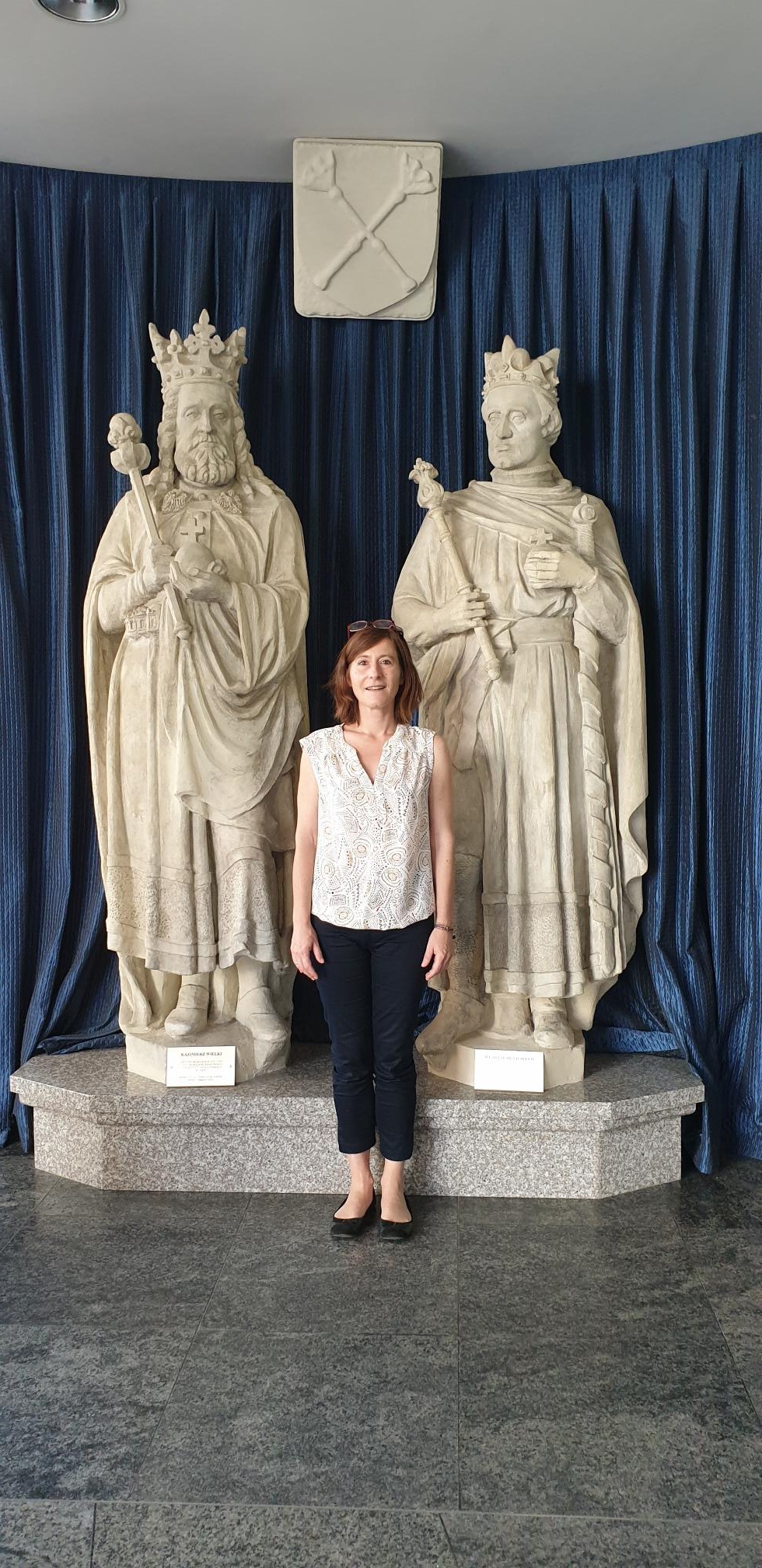
Publication date: 05.06.2019
__________________________________________
Paulina Podkalicka, our PhD student, has received a grant PRELUDIUM from the National Science Center - Targeting microRNA-378 in a mice model of Duchenne muscular dystrophy - a weapon against hallmark symptoms of the disease?
Publication date: 27.05.2019
____________________________________
Aleksandra Piechota-Polańczyk, PhD, has received a grant SONATA from the National Science Center - Fibrosis or senescence - why transcriptionally inactive Nrf2 protects against colon dysfunction.
Publication date: 27.05.2019
____________________________________
Jacek Stepniewski, PhD, has received a grant SONATA from the National Science Center - Regulation of microRNA-378 as a new approach to increase maturity and therapeutic potential of human cardiomyocytes derived from induced pluripotent stem cells.
Publication date: 27.05.2019
____________________________________
Prof. Józef Dulak, has received a grant MAESTRO from the National Science Center - Molecular mechanisms of heart failure in Duchenne and Becker muscular dystrophy
Publication date: 19.02.2019
____________________________________
Prof. Alicja Józkowicz, has received a grant MAESTRO from the National Science Center - Endothelial cells in the composition of hematopoietic niche: the versatile choir or specialized soloists?
Publication date: 19.02.2019
__________________________________________
Krzysztof Szade, PhD has received a grant HARMONIA from the National Science Center -Tracing the roots of leukemia -how pre-leukemic hematopoietic stem cells contribute to acute lymphoid and myeloid leukemias?
Publication date: 19.02.2019
_____________________________________
The visit of prof. Dulak in China
Prof. Józef Dulak has visited China (11th to 21st December), giving talks at Fudan University in Shanghai (13th December); Zhejiang University in Hangzhou (16th December) and Nanjing University Medical Hospital in Nanjing ( 17th December).


During this visit prof. Dulak signed the memorandum of understanding on academic cooperation and the establishment of a Sino-European Research Centre for Geriatrics. The first meeting and ceremony took place at the Huashan Hospital of Fudan University, with the participation of representatives of the Huashan Hospital (prof. Ding Qiang), the University Hospital rechts der Isar of the Technical University of Munich (prof. Markus Schwaiger) and University of Bern (prof. Axel Rominger). The visit of the European delegation to China (which included also the other scientists and clinicians from Munich and Bern) was kindly organized and co-ordinated by the Chinese hosts, with the help of Dr. Kuangyu Shi from Technical University of Munich and University of Bern.
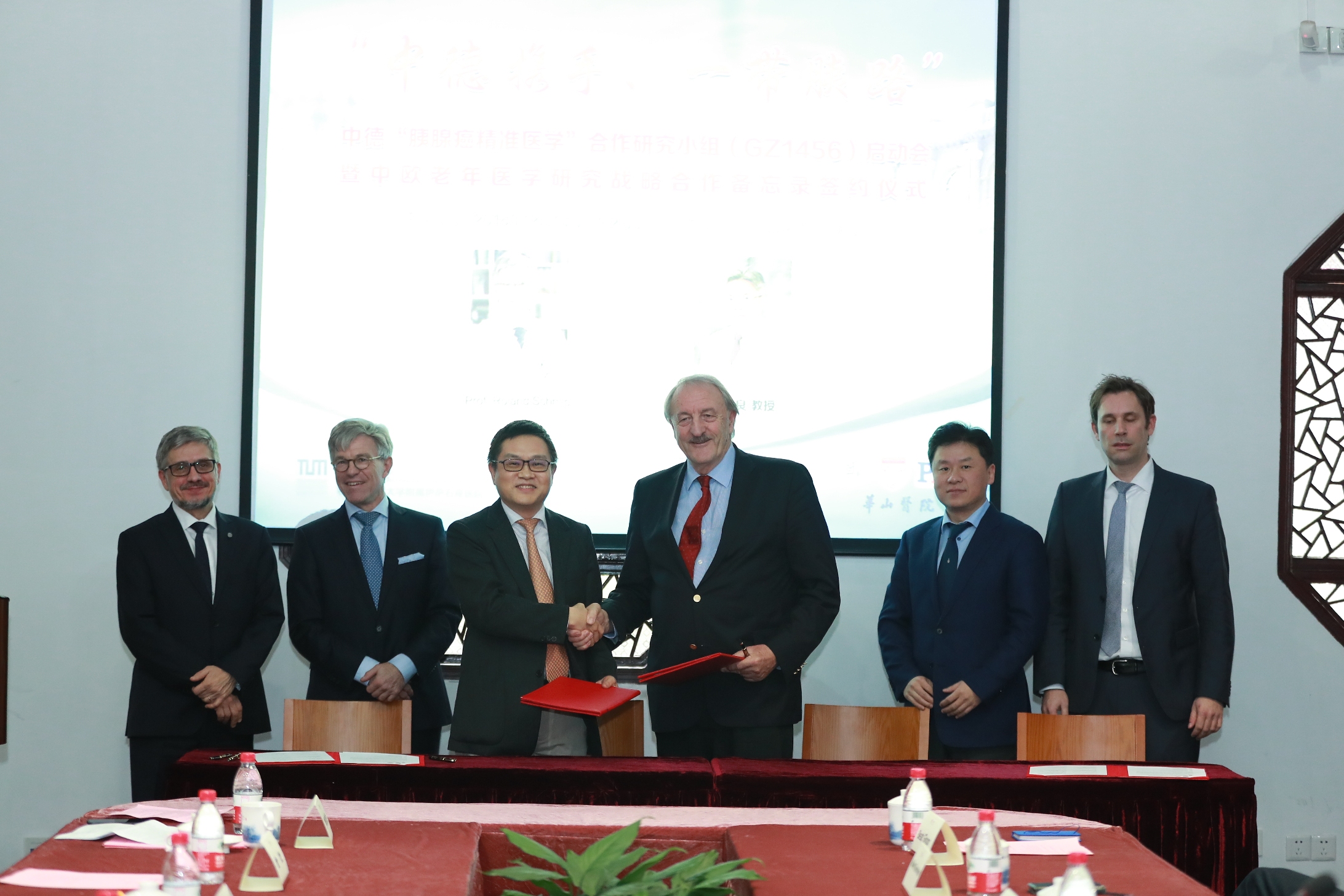
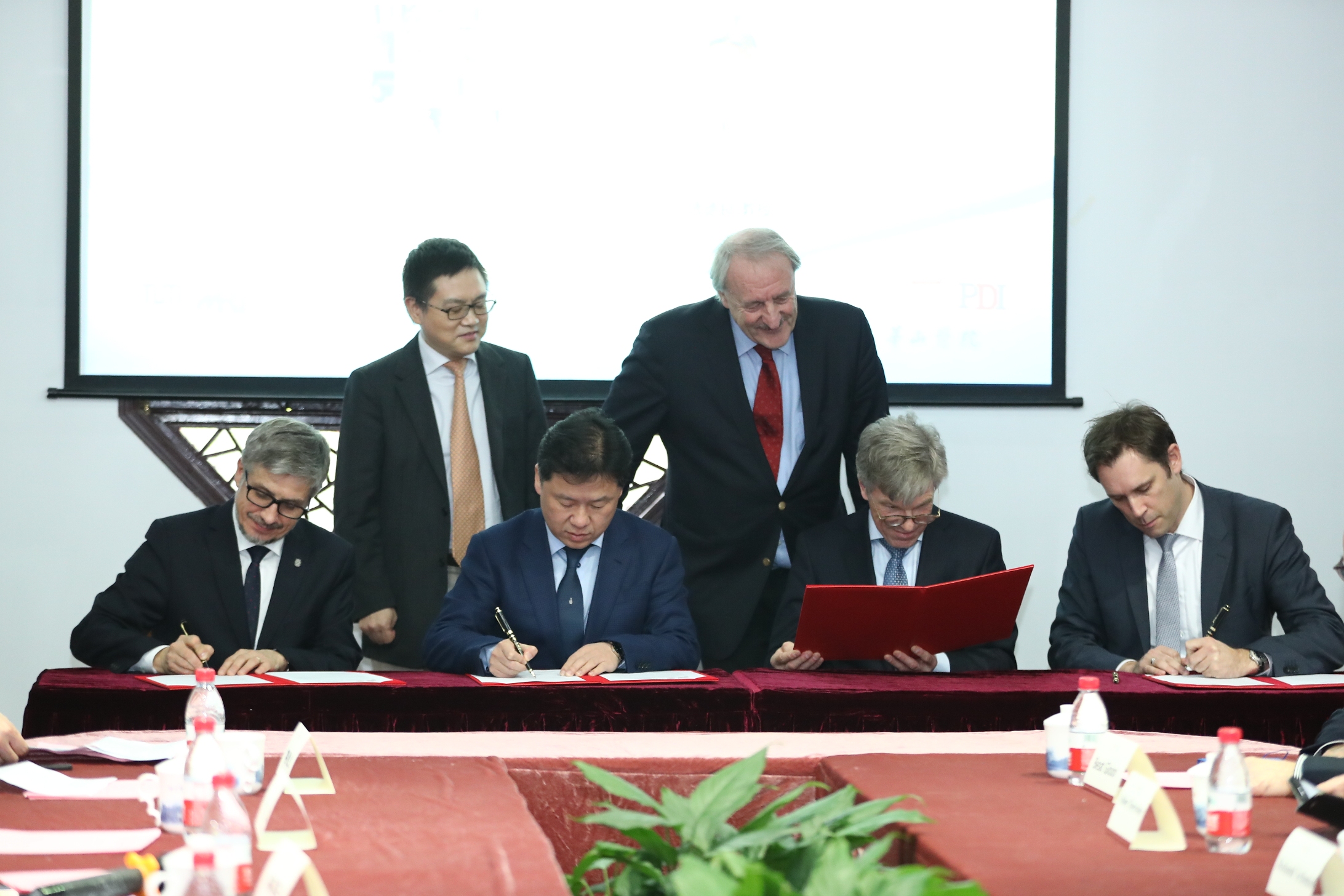
Publication date: 03.01.2019
_______________________________________
Prof. Federic Relaix "PAX3 controls the adaptive response of skeletal muscle stem cells to environmental stress"
On Friday, November 23, 2018, we stayed at Professor Federic Relaix from Universite Paris Est Creteil, Faculte to Medecine. He presented a lecture on "PAX3 controls the adaptive response of skeletal muscle stems to environmental stress"

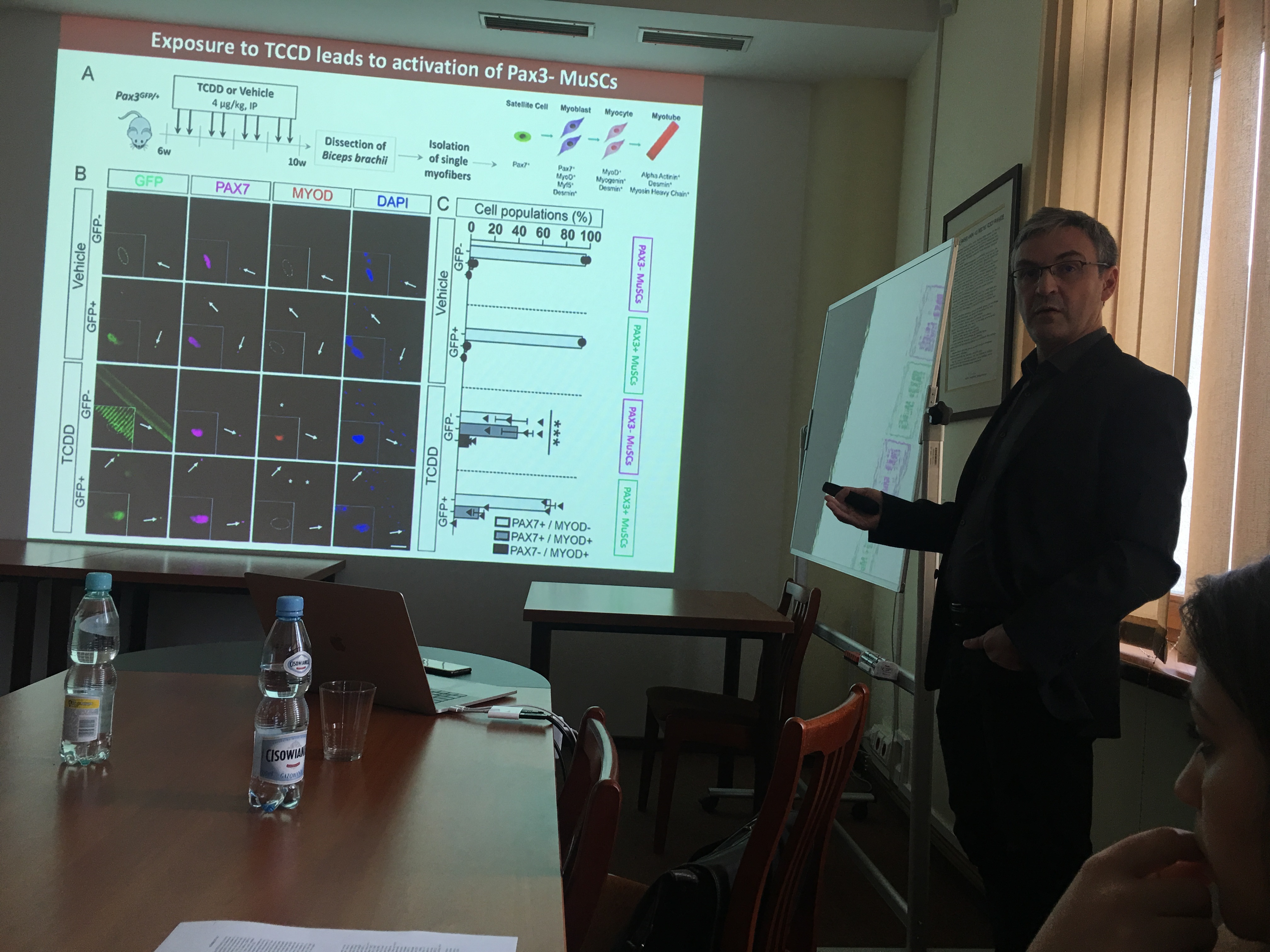
Publication date: 02.01.2019
_________________________________________
Prof. Graziella Pellegrini "Regenerative medicine from bench to bedside: overcoming the challenges to restore function"
On Monday, September 17, we hosted Professor Graziella Pellegrini from the Department of Life Sciences, University of Modena and Reggio Emilia, Modena, Italy, who presented a lecture "Regenerative medicine from bench to bedside: overcoming the challenges to restore function".

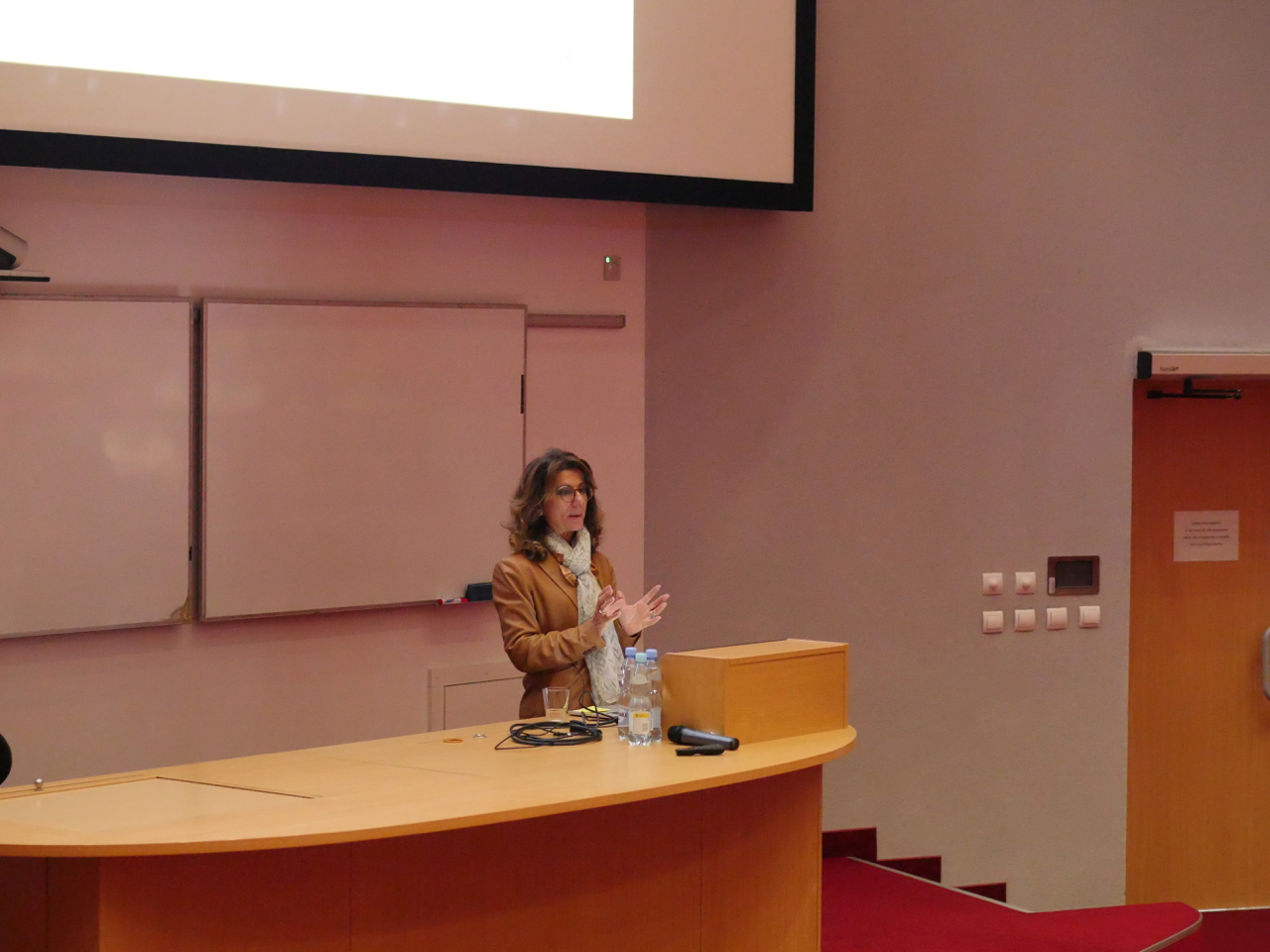
Publication date: 23.10.2018
_________________________________________
An American patent for the invention of scientists from the Department of Medical Biotechnology of FBBB UJ. The authors are: Agata Szade PhD, Krzysztof Szade PhD and prof. Alicja Józkowicz and prof. Józef Dulak
The patent consider application of cobalt protoporphyrin IX for mobilization of bone marrow cells to peripheral blood. Mobilization of bone marrow cells is used in treatment of blood-related disorders, especially in treatment of neutropenia and isolation of hematopoietic stem cells for transplantation. Patent was granted to Jagiellonian University by United States Patent and Trademark Office (Patent No. US 10,010,557 B2: "Cobalt porphyrins for the treatment of blood-related disorders")
Publication date: 17.08.2018
________________________________________
Krzysztof Szade, PhD has received a grant HOMING 2018 from the Foundation for Polish Science - Aging of hematopoetic stem cells - unrevealed role of Neogenin-1/Netrin-1 axis.
Publication date: 17.08.2018
________________________________________________
Mateusz Jeż our PhD student has received a grant PRELUDIUM from the National Science Center - Role of microRNA-15 family, cell metabolism and hypoxia in proliferation of cardiomyocytes derived from human induced pluripotent stem cell.
Publication date: 12.06.2018
_________________________________________
Prof. David Bryder "Hematopoietic stem and progenitor hierarchies in health and disease"
On Tuesday, June 5, we hosted Professor David Bryder from the University of Lund in Sweden, who presented a lecture "Hematopoietic - hierarchies of stem and progenitor in health and disease".
Professor Bryder is a recognized authority in the field of normal and pathological hematopoiesis. His team deals with research on such processes as the maturation of blood cells, their aging and neoplastic transformation. Professor David Bryder is also a laureate of a number of grants and prizes, including the prestigious ERC Consolidator Grant and the Tobias Prize of the Royal Swedish Academy of Sciences. Our guest will present his lecture at the invitation of the Medical Biotechnology Department and the Cracow Branch of the Polish Society of Cell Biology.
Publication date: 12.06.2018
________________________________________
Prof. Andrew Newby "Cardiovascular Diseases: New Research and Clinical Strategies"
On May 7-21, 2017, we hosted prof. Andrew Newby who is an outstanding expert in vascular biology and atherosclerotic processes. He was one of the first to apply gene transfer techniques to blood vessel cells. He made a special contribution to studies of the role of metalloproteinases in physiological and pathological processes. He gave a series of lectures under the common title "Cardiovascular diseases: new research and clinical strategies"


Publication date: 27.05.2018
_______________________________________
Monika Żukowska (our PhD student) has received a grant "Preludium" from the National Science Centre - Guardian of a cell cycle: role of HO-1 in HSC proliferation.
Publication date: 27.11.2017
_______________________________________
Prof. Alicja Józkowicz (PhD, DSc) has received a grant "Opus" from the National Science Centre - Heme and G-quadruplexes: an overlooked function of heme oxygenases?
Publication date: 27.11.2017
_______________________________________
L'Oreal Stipend for Anna Konturek
Publication date:02.08.2017
_______________________________________
Mateusz Tomczyk, our PhD student, has received a grant "ETIUDA" from the National Science Centre
Immune response in remodeling and regeneration of cardiac muscle following myocardial infarction. Significance of macrophages and heme oxygenase-1.
Publication date:02.08.2017
_______________________________________
Prof. Józef Dulak's team in MSCA-RISE Program (Horyzont 2020)
Prof. Józef Dulaka received funding of 45 000 euro under the project titled "Heart On Chip based on human-induced pluripotent stem cell technology for personalized medicine (acronym: CISTEM). The CISTEM project will be implemented by an international consortium - one of the 80 that has qualified for the Horizon 2020 Framework Program within the Marie Skłodowska-Curie Framework Program - Research and Innovation Staff Exchange (RISE).
The consortium consists of four academic units:
- BioSense Institute (Novi Sad, Serbia)
- Department of Medical Biotechnology, Jagiellonian University, Krakow, Poland
- Applied Mechanics and Bioengineering, Institute of Engineering Research, University of Zaragoza (Zaragoza, Spain)
- Department of Biomedical Engineering, Rutgers University, (Piscataway, New Jersey, USA)
and three companies:
- Elvesys (Paris, France)
- Cherry Biotech (Rennes, France)
- Beonchip SL (Zaragoza, Spain)
The coordinator of the project is Dr. Georges Dubourg from the Biosense Institute.
Publication date:20.07.2017
________________________________________
Polish-French Workshop of the International Associated Laboratory Jagiellonian University - CNRS
On 26th and 27th June at the FBBB, Polish – French workshop was held to summarize the four-year collaboration (2013-2016) between the Department of Medical Biotechnology and the Molecular Biophysics Center (CNRS) in Orléans under the International Associated Laboratory (LIA). The laboratory is a joint undertaking by the Department of Medical Biotechnology at the JU Faculty of Biochemistry, Biophysics and Biotechnology and the Cell Recognition and Glycobiology team of the CNRS Centre for Molecular Biophysics in Orleans. The laboratory was directed by Prof. Józef Dulak and Prof. Claudine Kieda (2013-2016), and now after four successful years the LIA team has renewed the application to CNRS and the extension of LIA for the 2017-2020 has been awarded by CNRS. The LIA will now work on the “Biomarkers and mediators of diseases” (under the acronym miRTangO-BIS), coordinated by prof. Józef Dulak and prof. Eva Jakab-Toth.
Publication date:02.07.2017
________________________________________
Agnieszka Jazwa (PhD) and Mateusz Tomczyk (Msc) awarded at the conference in Geneva
Publication date:02.07.2017
________________________________________
The National Science Centre - Sonata Bis Programme - Senescence or apoptosis: role of miR-34a in endothelial cells. 2017-2022, Principal investigator – Anna Grochot-Przęczek
Publication date:01.02.2017
________________________________________
Interview with prof. Jozef Dulak on RMF FM
http://www.rmf24.pl/nauka/news-mowiac-o-polskiej-nauce-nie-musimy-wciaz-narzekac-jest-wiele,nId,2320172
Publication date:13.12.2016
________________________________________
Prof. Hozumi Motohashi visits the Jagiellonian University
Prof. Hozumi Motohashi from the Tohoku University in Sendai is an eminent expert in the area of oxidative stress research, stem cell differentiation mechanisms, metabolism and cancer cells.
From 17th November to 26th November 2016 she visited our Department as a visiting professor at the JU Faculty of Biochemistry, Biophysics and Biotechnology, invited by the JU Department of Medical Biotechnology within the framework of KNOW, and gave a series of lectures on the role of NRF2 transcription factor under pathophysiological conditions, entitled KEAP1-NRF2 system as a cysteine-based redox sensor for our defense mechanism.
Publication date:26.11.2016
________________________________________
Agnieszka Łoboda (PhD, DSc) has received a grant "Opus" from the National Science Centre - Impaired angiogenesis in Duchenne muscular dystrophy - is there a role for heme oxygenase-1 and statins?
Publication date:18.11.2016
________________________________________
Interview with prof. Jozef Dulak in the weekly “Polityka”
In the 42 issue of the Polish weekly "Polityka" has been published an interview with prof. Jozef Dulak, dedicated stem cells entitled: „Cudowne i niebezpieczne”.
The full article (publication with the explicit consent of the "Polityka"), also has been published on the Jagiellonian University’s website, and is available: http://www.uj.edu.pl/wiadomosci/-/journal_content/56_INSTANCE_d82lKZvhit4m/10172/134561529
________________________________________
Szymon Czauderna, our PhD student, as a co-author of paper published in “Cell”
In September 2016, an article by a research team from Whitehead Institute in Massachussets, (USA), lead by prof. Rudolf Jaenisch, was published in “Cell”. One of the co-authors of the paper “Editing DNA methylation in the mammalian genome”, is our PhD student Szymon Czauderna.
Publication date:26.09.2016
________________________________________
The paper about new mechanisms in the development of rhabdomyosarcoma (RMS), the most common soft tissue tumour in children has been just published by our group in Cancer Research.
In August 2016, an article by a research team from Department of Medical Biotechnology was published in Cancer Research, one of the leading oncology journals. The paper "Heme oxygenase-1 controls an HDAC4-miR-206 pathway of oxidative stress in rhabdomyosarcoma" Ciesla M, Marona P, Kozakowska M, Jez M, Seczynska M, Loboda A, Bukowska-Strakova K, Szade A, Walawender M, Kusior M, Stepniewski J, Szade K, Krist B, Yagensky O, Urbanik A, Kazanowska B, Dulak J, Jozkowicz A, Cancer Res. 2016 Aug 3, is about new mechanisms in the development of rhabdomyosarcoma (RMS), the most common soft tissue tumour in children. It describes the crucial role of heme oxygenase-1 (HO-1) in the cells of this type of cancer. The sarcoma is supposedly caused by disturbed differentiation of muscle stem cells.
Publication date:24.08.2016
________________________________________
Prof. Rudolf Jaenisch visits the Jagiellonian University
On 31 May - 2 June 2016, founding member of the Whitehead Institute for Biomedical Research, a pioneer in research on epigenetic mechanisms, created the first transgenic mice and enormously contribued to advances in understanding of embryonic stem cells and induced pluripotent stem (IPS) cells as well as their therapeutic applications, prof. Rudolf Jaenisch visited Jagiellonian University and our Department.
Publication date: 03.06.2016